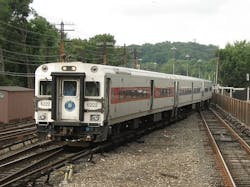FRA Issues 'Urgent Call to Action' to Metro-North Railroad After String of Accidents
After a spate of accidents on the nation’s second-busiest commuter railroad, the Federal Railroad Administration has ordered New York’s Metropolitan Transportation Authority to develop plans to improve safety for riders and rail workers.
In an assessment spurred by the Dec. 1 derailment that killed four people and injured more than 70, the agency asserts that the Metro-North Commuter Railroad “has emphasized on-time performance to the detriment of safe operations and adequate maintenance of its infrastructure.”
“This led to a deficient safety culture that has manifested itself in increased risk and reduced safety on Metro-North,” the Federal Railroad Administration explains in its report. “This is a severe assessment, and it is intended as an urgent call to action to Metro-North’s leadership as they work to develop a comprehensive plan to turn Metro-North into a model of safe railroad operations.”
Metro-North serves nearly 83 million riders annually in New York, New Jersey and Connecticut. As part of “Operation Deep Dive,” more than 60 technical and human-factor experts analyzed the railroad's safety processes, culture and compliance, according to FRA. Based on the analysis, the agency said its top concerns include the Metro-North’s poor safety culture and ineffective training program.
Among the agency’s overarching recommendations:
- Metro-North’s senior leaders immediately must make safety the No. 1 priority, communicate the value of safety to the rest of the organization and put their words into action.
- Within 60 days, Metro-North must evaluate all facets of its safety function and submit an improvement plan for it.
- Within 60 days, Metro-North must submit a plan for improving its worker-training efforts.
The Federal Railroad Administration’s report came just a few days after a Metro-North employee was struck and killed by a train while he was helping crew members restore power to tracks that had been closed for weekend maintenance. Also, in May 2013, a Metro-North foreman was struck and killed by a train while he was working on tracks that were supposed to be out of service for a construction project.
Giulietti, who took the helm of Metro-North in February, said the railroad will incorporate FRA’s recommendations into a 100-day plan that the railroad developed to improve safety and operational performance.
"We will improve how we train our employees and how we monitor their performance,” Giulietti said. “We are reorganizing our safety department. We have agreed to and are creating a confidential close-call reporting system so that employees can report safety issues without fear of reprisal.
“We are improving how we inspect our tracks and equipment, and how we perform maintenance on the right of way. We are buying new equipment. We are hiring more staff. We are changing our management structure and we’re reaching out to our partners in labor – all to make this railroad as safe as possible.”

